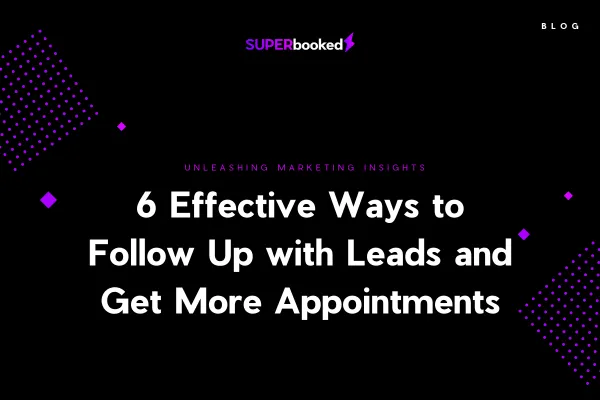Tips for success
Blog

6 Effective Ways to Follow Up With Leads and Get More Appointments
For those running an appointment-based business, understanding the crucial aspect of success lies in generating leads and effectively converting them into paying customers. However, one may wonder, what is the most effective approach to achieve this?
There are a lot of different strategies out there, but one of the most effective is following up with leads. By doing a follow-up on leads, you can build relationships, establish trust, and eventually turn them into paying customers. But how do you go about following up with leads in an effective way? Here are a few tips:
Make it personal
Personalization can be a game-changer when following up with potential customers or clients. In a world where we are bombarded with countless generic messages every day, taking the time to personalize your communication can make a significant impact.
One of the most effortless ways to personalize your message is by addressing the person by name. This simple gesture can make them feel seen and valued as individuals rather than just another lead in your pipeline. It also shows that you are dedicated time and effort to tailor your message specifically to them rather than using a one-size-fits-all approach.
In addition to using their name, try to mention something specific about their situation. This could be a pain point they said in their initial inquiry or a detail about their business that you found during your research. By referencing something relevant, you showcase your thorough preparation and genuine interest in assisting them.
Personalization can also build trust and rapport with the person you follow up with. Demonstrating a genuine commitment to understanding their needs and challenges increases the likelihood of being regarded as a partner rather than just a vendor. This can ultimately lead to a more successful working relationship in the long run.
Be timely
When it comes to following up with leads, timing is crucial. The longer you wait to reach out, the less likely you will be able to convert that lead into an appointment or sale. This is because leads often explore multiple options and may have already moved on to a competitor or forgotten about you entirely.
That's why it's important to be timely with your follow-up. Research has shown that following up within the first hour of receiving a lead can increase your chances of converting that lead by as much as 7x compared to waiting just one hour longer.
Aim to follow up with leads within 24 hours of receiving their information. This demonstrates that you respect their time and are dedicated to providing them with the knowledge and support they need to make a decision. It also helps keep you in mind and reinforces the idea that you are the best option for their needs.
Be consistent
Consistency is key when it comes to following up with leads. While it's important to be timely with your initial follow-up, it's equally important to follow up consistently over time. This is because most leads require multiple touchpoints before they are ready to make a decision.
To be consistent in your follow-ups, create a schedule or system that ensures you reach out to each lead regularly. This could include a combination of phone calls, SMS, emails, and other communication channels.
Maintaining consistency ensures you remain at the forefront of the lead's mind while indicating your steadfast commitment to offering them the necessary information and support throughout their decision-making process. By employing this approach, you can foster trust and credibility with the lead, making them more likely to choose your appointment-based business over competitors.
However, finding a balance between persistence and respecting the lead's time and preferences is crucial. If a lead explicitly states that they are not interested or have chosen a different provider, it's essential to respect their decision and move on to other leads. But for those who have expressed interest, consistency in your follow-up is vital to converting them into customers.
Use multiple channels
Using multiple communication channels is a smart strategy to improve your chances of reaching your leads and getting more appointments. While phone calls and emails have long been the go-to channels for appointment-based businesses, it's critical to recognize that people have different communication preferences. Therefore, diversifying your outreach can help you connect with leads in ways that are convenient for them.
You can leverage several channels to communicate with your leads, including SMS, email, phone, social media, and even direct mail. For example, you might send an introductory email to your lead and follow up with a phone call a few days later. Or you might use social media to connect with a lead and then send a direct mail piece with more information about your services.
Consider your target audience and their communication preferences when deciding which channels to use. For example, younger demographics may be more likely to respond to social media messages, while older demographics may prefer phone calls or direct mail. In addition, you may want to consider the type of service you are offering, as certain channels may be more effective for specific types of appointments.
You can also use a customer relationship management (CRM) tool to track channels used for lead tracking. Utilizing this software can help you streamline your follow-up process, increase efficiency, and improve your chances of converting leads into appointments and sales.
By using multiple communication channels, you increase the likelihood of reaching your leads effectively and showcase your unwavering dedication to delivering exceptional customer service. However, it's essential to refrain from bombarding your leads with too many messages, which can be overwhelming and lead to them disengaging with your business.
Keep it short
When following up with potential customers, it's important to remember that less is often more. People are busy and don't have time for lengthy sales pitches, so keeping your conversation concise and focused is important. This means getting straight to the point and communicating your message clearly and effectively.
One way to keep your follow-up brief is to plan and prepare a clear outline or a lead follow-up script that you can use. This will help you stay on track and avoid rambling or going off-topic. It's also necessary to respect your lead's time and schedule. Make sure to ask if they have a few minutes to chat before launching into your pitch, and feel free to wrap things up quickly if they seem busy or disinterested.
Remember, the goal of a follow-up is to build a relationship with your lead and equip them with invaluable information about your product or service. Keeping your conversation short and sweet will make you more likely to make a positive impression and leave a lasting impact.
End with a call to action
A call to action is a vital part of any effective follow-up. It's the final step in your conversation with a potential customer or lead, ultimately moving them closer to deciding on your product or service.
There are numerous types of calls to action that you can use, depending on the specific goals of your follow-up. Some examples include:
Requesting another meeting: If your lead seemed interested in your product or service but didn't commit to anything during your initial conversation, it's a good idea to suggest a follow-up meeting. Depending on your preference and availability, this could be in person, over the phone, or via video chat.
Offering a free consultation or trial: Another compelling call to action is to provide a no-obligation consultation or trial of your service or product. This can help your lead better understand what you offer and may encourage them to move forward with a purchase.
Inviting them to take a specific action: If you have a clear next step you'd like your lead to take, such as signing up for a newsletter or maybe downloading a free resource from your website, include that in your call to action.
Final thoughts
Lead conversion is integral to any appointment-based business, and following up with leads is essential to the sales process. That's why it's important to make sure you're using the appropriate channels for your target audience, and by leveraging the right tools and services, you can improve your chances of connecting with potential customers and getting more appointments. However, it's also important to remember to avoid overwhelming your leads by bombarding them with too many messages or taking up too much of their time. Keep conversations short but effective and always end on a call-to-action so that you can move closer to closing a sale. With these suggestions in mind, you should be able to create an effective follow-up strategy that helps drive more business for your company.
